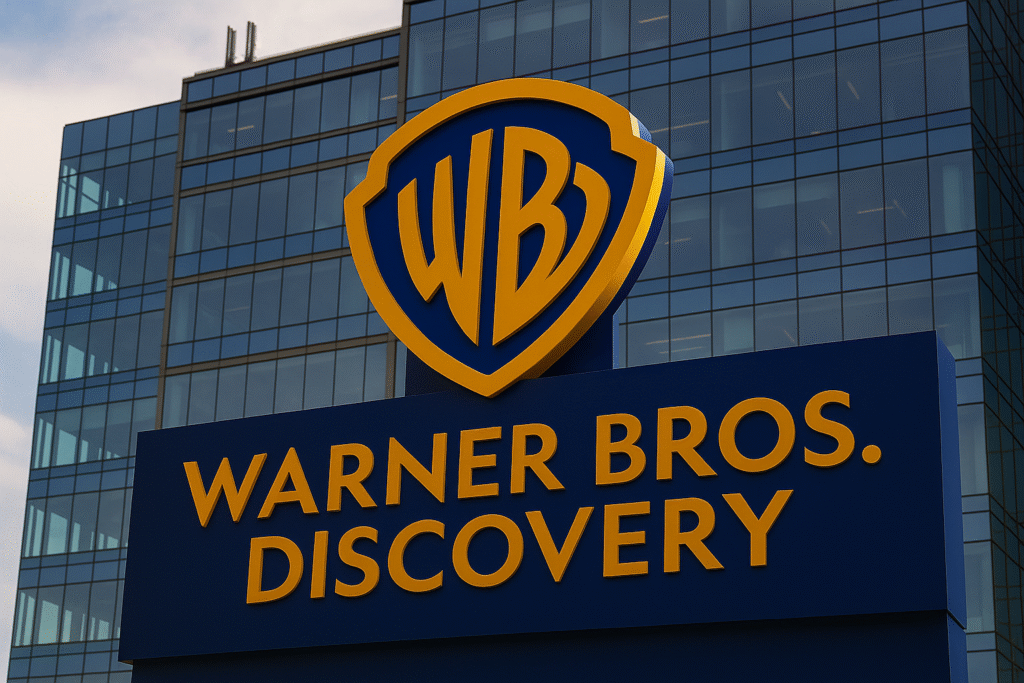WBD Considers All Options Amid Strategic Review
Warner Bros. Discovery (WBD) said Tuesday it is expanding its ongoing strategic review and is open to a sale, marking a pivotal moment for one of the world’s largest entertainment companies. The move sent shares soaring more than 10% in early trading as investors digested the potential for a major media reshuffling.
The review comes months after WBD announced plans to split into two standalone companies — one focused on streaming and studios and the other on global networks. While that plan is still moving forward, CEO David Zaslav said the company has also received unsolicited approaches from several interested parties, prompting management to evaluate all possible paths to “unlock full shareholder value.”
Among the rumored suitors are Netflix (NFLX) and Comcast (CMCSA), as well as the newly merged Paramount–Skydance, which reportedly made multiple offers that WBD declined.
The Media Landscape in Flux
If a sale or merger were to proceed, it could reshape Hollywood’s competitive structure once again — just two years after the WarnerMedia–Discovery merger created WBD.
For potential buyers, the deal could offer access to a deep portfolio of IP and production assets, including:
- Warner Bros. Studios (home to Harry Potter and DC Comics franchises)
- HBO and HBO Max (streaming and prestige TV assets)
- Discovery’s global non-fiction channels and production arms
However, any acquisition would likely focus on specific divisions — particularly streaming and studio assets — rather than WBD’s legacy cable networks, which continue to face subscriber erosion.
Sources told CNBC that Netflix isn’t interested in buying legacy media divisions, but wants to ensure the assets don’t fall into the hands of a competitor at a discounted valuation. Comcast, meanwhile, is reportedly evaluating its options but has not formally pursued a deal.
Debt and Industry Pressures
The 2022 merger between WarnerMedia and Discovery Inc. left WBD with over $40 billion in debt, forcing the company into a period of aggressive restructuring. It has since cut costs, reduced content spending, and prioritized major franchises like Harry Potter and Game of Thrones spinoffs to drive revenue and subscription growth.
Still, despite progress on debt reduction, investor sentiment remains mixed. WBD’s cable network portfolio continues to weigh on valuation as consumers increasingly shift toward streaming and ad-supported digital models.
A potential sale, or even the perception of renewed acquisition interest, could give WBD a near-term boost — though it underscores broader instability across the traditional media sector as legacy players struggle to adapt to new economics.
WSA Take
Warner Bros. Discovery’s openness to a sale signals how consolidation pressure has returned to the media industry’s top tier. As streaming competition intensifies and debt burdens linger, even giants like WBD are being forced to reassess their long-term strategies.
Whether a buyer emerges or not, the announcement confirms one thing: legacy media is no longer immune to the M&A wave reshaping tech and entertainment.
WBD’s vast content library remains valuable, but its structure — split between traditional networks and digital platforms — may be better suited for specialized ownership or partnership models. The coming months will determine whether the company stays independent or becomes the next domino in Hollywood’s consolidation cycle.
Read our latest coverage on Amazon’s AWS outage and its implications for global systems.
Visit the Wall Street Access homepage.
Disclaimer
Wall Street Access does not work with or receive compensation from any public companies mentioned. Content is for educational and entertainment purposes only.








